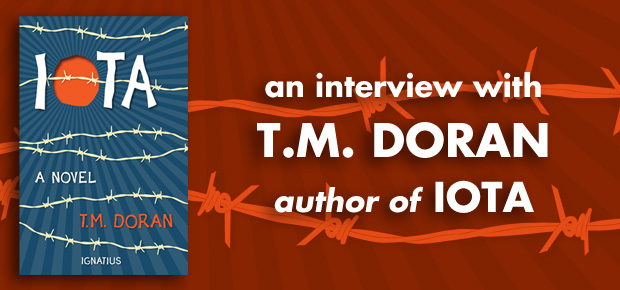
T. M. Doran’s third novel from Ignatius Press, Iota, has just been published. The story of a man imprisoned by the Communist Russian “liberators” of Prague following World War II, Iota has been hailed as a dark and gripping exploration of themes such as conscience, guilt, complicity, and innocence. It is available now in hardcover and e-book.
The author recently spoke with Ignatius Press Novels via e-mail.
Many people shared their reminiscences this past weekend as the twenty-fifth anniversary of the fall of the Berlin Wall was commemorated. Though the majority of your novel takes place during the early Communist era, it is bookended with the dismantling of the Wall. How did that event effect you—any particular memories?
Doran: I have a keen interest in the period of history when the Wall went up, along with the events that led up to it going back to World War II. Hiking through Europe as a college student, I remember that visiting Eastern Europe was out of the question. I was amazed at how suddenly the Wall came down, and how peacefully. Most of Iota takes place when walls and cages were going up, while the backdrop of the Wall coming down complemented what was going on inside the characters in that scene.
Jan Skala is conflicted about acts he was forced to do while living under Nazi occupation, and is now being forced into a position where he is being pressured to act against his conscience by the Communists. In a time where we are once again asking ourselves if the state should have any restraint upon itself upon consciences, what do you hope readers might learn from your novel?
Doran: What Jan and some of the others experienced can be considered a severe examination of conscience, something that doesn’t occur for many until a catastrophe is experienced and we are compelled to look at the most essential things. How could Jan be honest with others if he refuses to be honest with himself? As to states and conscience, they will do whatever they can, and must be regulated by people of conscience, or oppression becomes the norm.
 In the prison where Jan is kept, he tries to connect with the others in captivity. But it is hard to know who to trust, and who is telling the truth about themselves. What do you think the loss of trust does to society?
In the prison where Jan is kept, he tries to connect with the others in captivity. But it is hard to know who to trust, and who is telling the truth about themselves. What do you think the loss of trust does to society?
Doran: Early in the composition of Iota, I envisioned the title of the novel depicted phonetically. Reading phonetically, individual sounds are emphasized rather than the word itself. Similarly, though in close proximity to one another and sharing common depredations (one word, so to speak), these prisoners are isolated from each other by distrust, fear, and hatred. In spite of this, humanity is demonstrated, or emerges, in several characters, though a long time in coming for some. You could say that for prisoners and jailers alike, it’s butterfly or bust; remaining an ordinary caterpillar isn’t an option.
In Toward the Gleam, philosophical ideas play a large role in a rather elaborate plot. Now in Iota, the plot is smaller, but the ideas loom even larger. Why should we care about philosophical differences? Aren’t they rather abstract?
Doran: I desired to tell a vivid, suspenseful story about the chaotic post-World War II period that would keep readers emotionally and intellectually engaged. Conversations such as these let the reader look inside the prisoners, as they themselves struggle with whether any philosophy or ideology can make sense of what they are experiencing. As much as possible, I believe that novelists should keep their own views out of their characters mouths—making them into sock puppets, which is different than authors bringing their perspectives to the story and characters.
In a way, the conversations between prisoners in the “cage” recall the characters in the novels of Solzhenitsyn. Was he an influence on your writing?
Doran: Solzhenitsyn, Orwell, Pasternak, Bradbury, Walter Ciszek, all of these describe dystopian worlds, whether imagined or personally experienced. The Chinese essayist, poet, and dissident, Liu Xiaobo, is doing the same thing today. Orwell’s 1984 convinced me that a little darkness goes a long way. That’s why Iota is such a short novel. As to the cages, abattoir, and site, I have detailed sketches of the physical environment and journal entries exploring their deeper meanings.
You are a fan of mystery stories. (Readers: see here for more). How did mystery fiction contribute to the plot of Iota—or would that be telling?
Doran: As with Terrapin, I wanted Iota to be a rousing story that happened to include mysteries, rather than a mystery story. The Count of Monte Cristo, which has some echoes in Iota, is also such a story. Some of the mysteries in my stories are explained, some are left to the reader to decipher, and a few may be known only to the author—for instance, the personality and behavior of the Russian major; different than classic mystery stories where all the loose ends are tied up.
Do you have any new novels in the works?
Doran: I’m always working on a story or two, no two alike: composing, revising, researching, journaling, mapping, experimenting with scenes and vignettes to see if they work. A young man—Jewish, as it happens—let me know how much he enjoyed Iota, if such a word can be used about such a story. Though he grasped many of the philosophical conversations, he told me that the most important thing was the story itself, the people and what they experienced. That’s what I’m striving to achieve when I write.






Leave a Reply